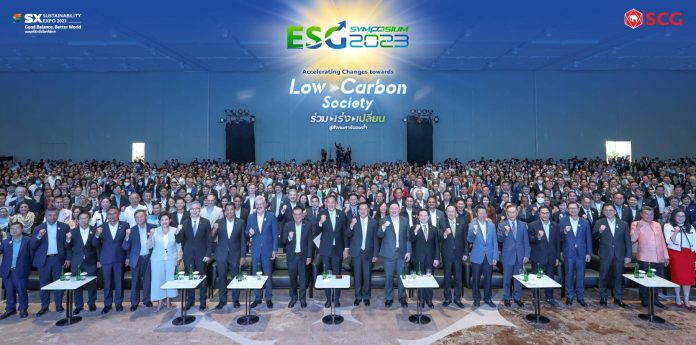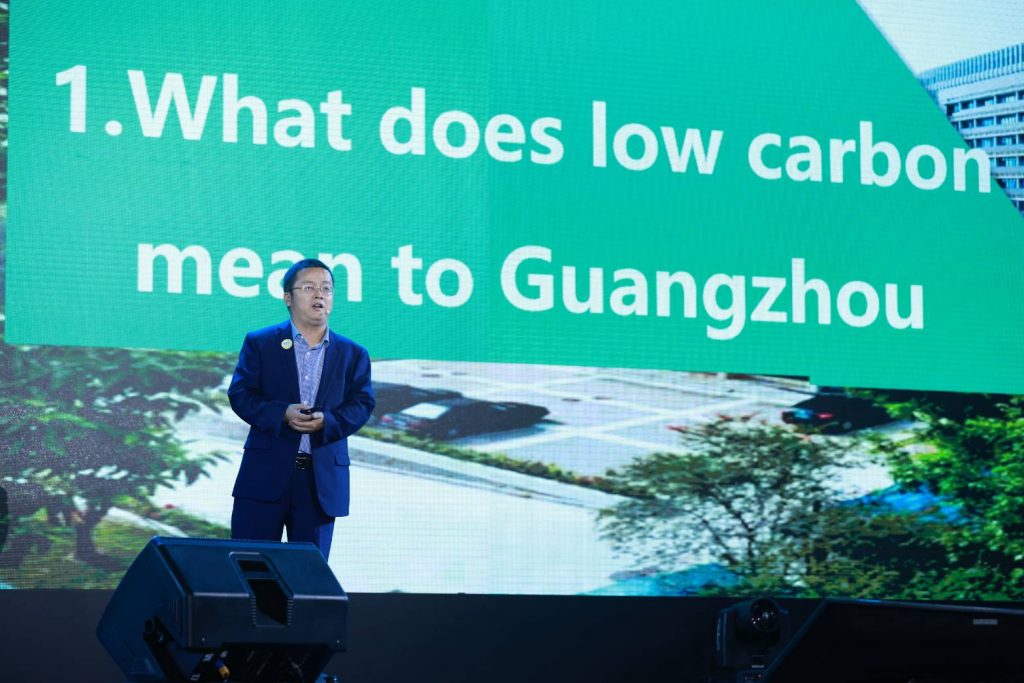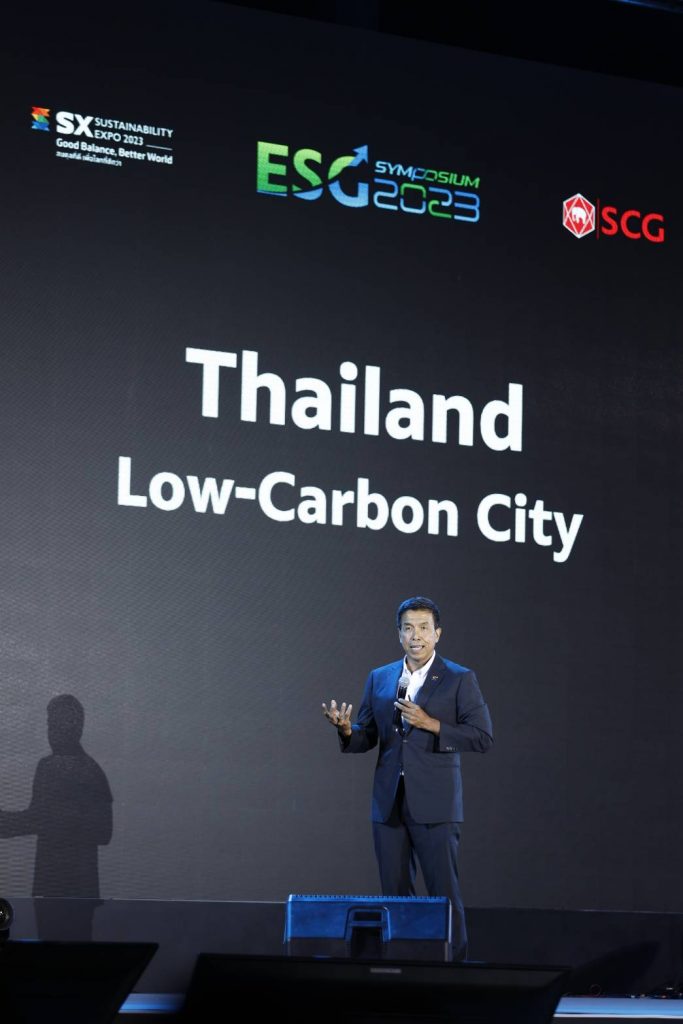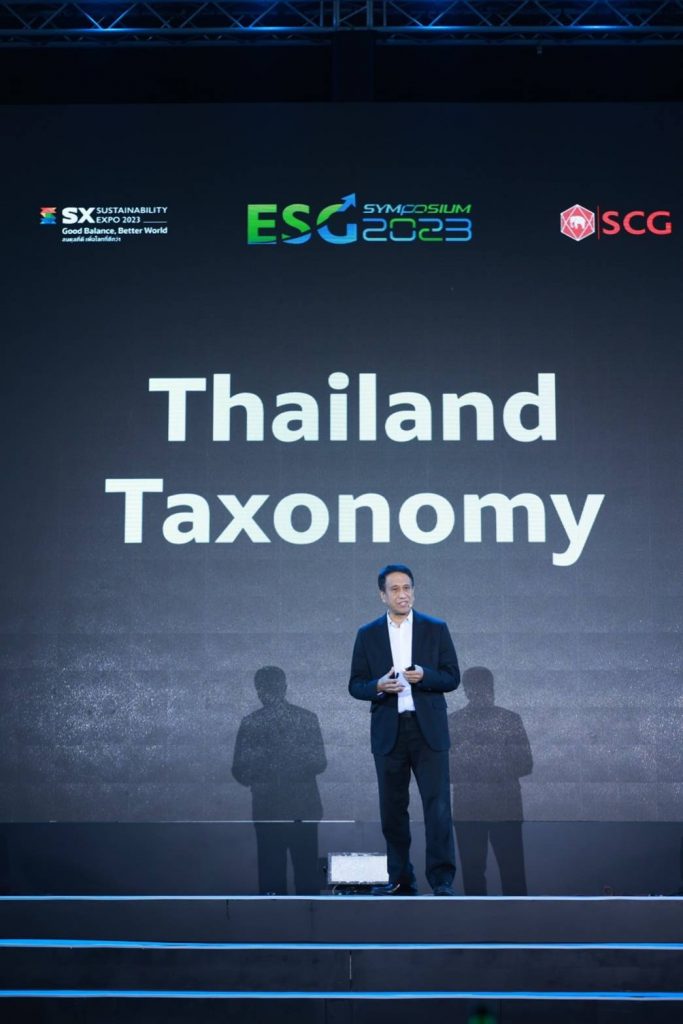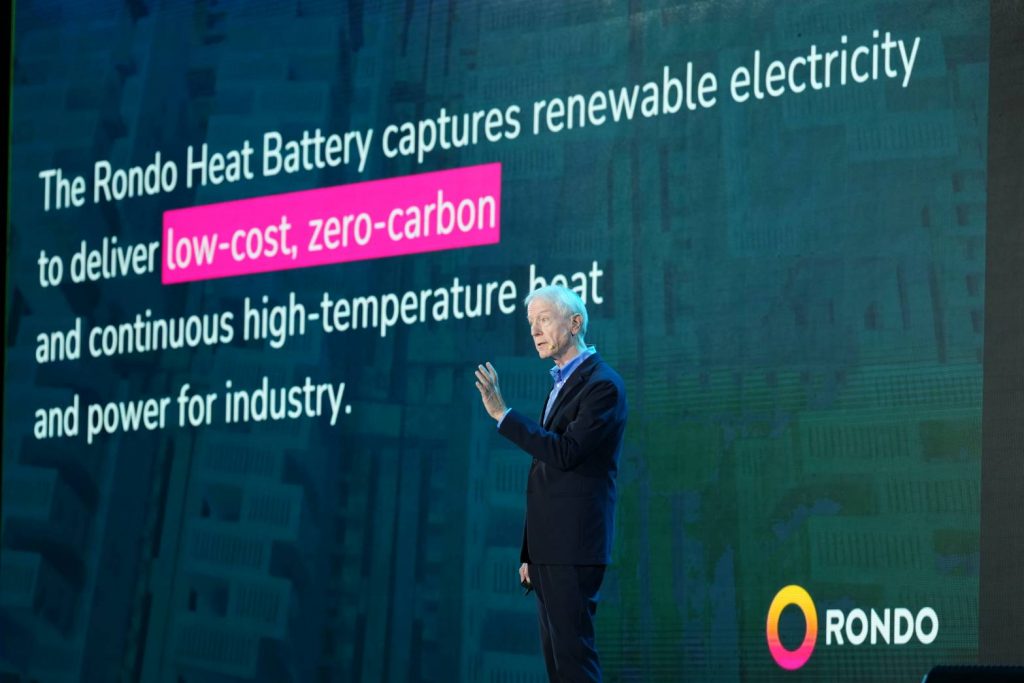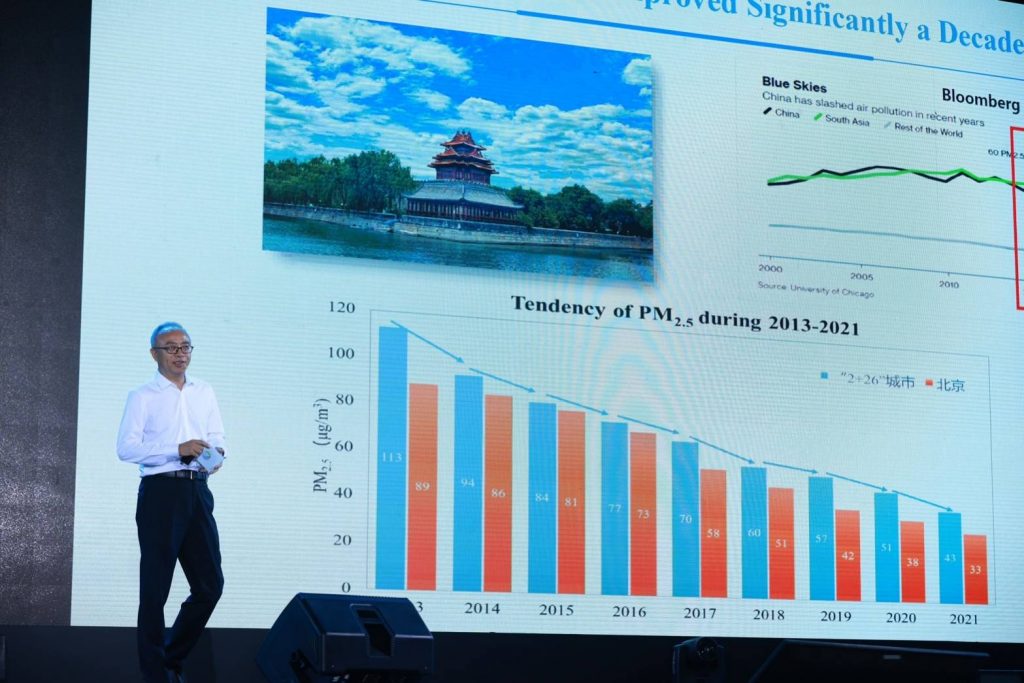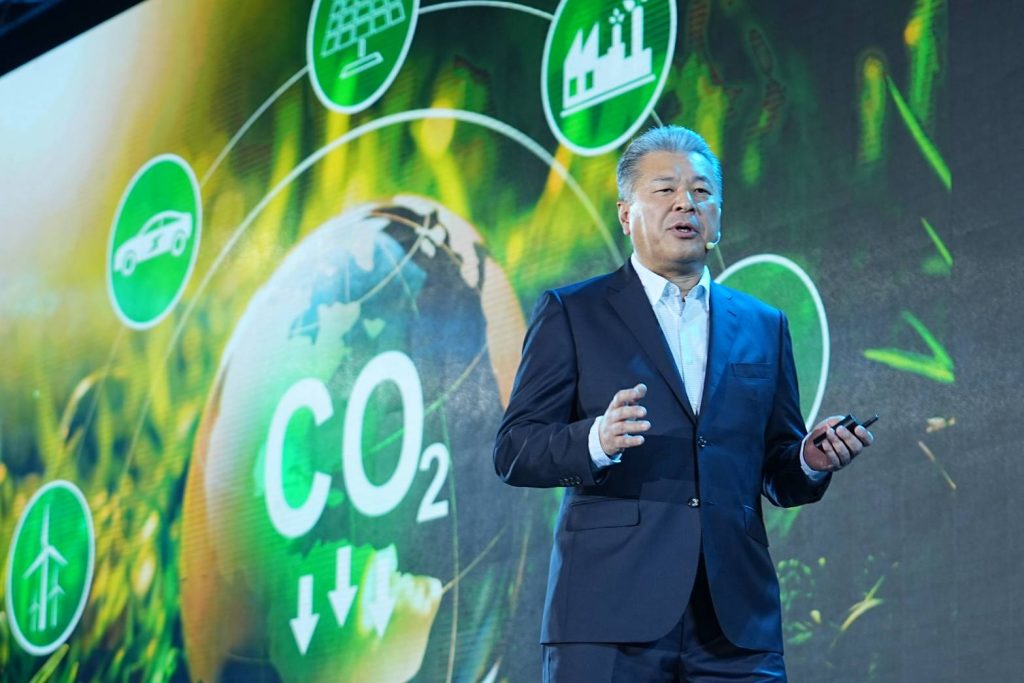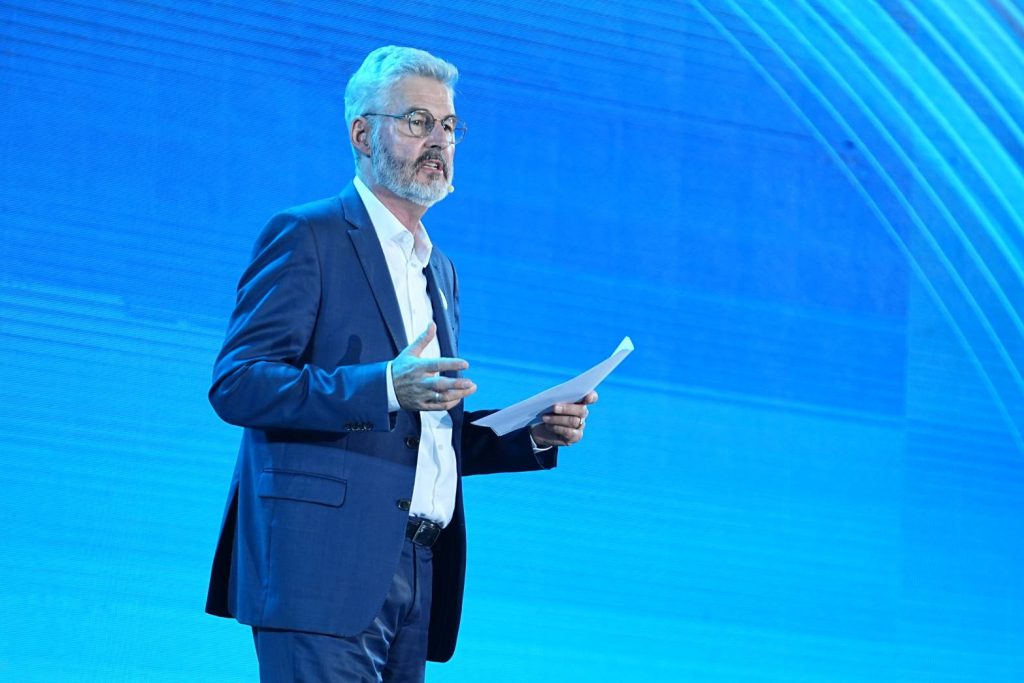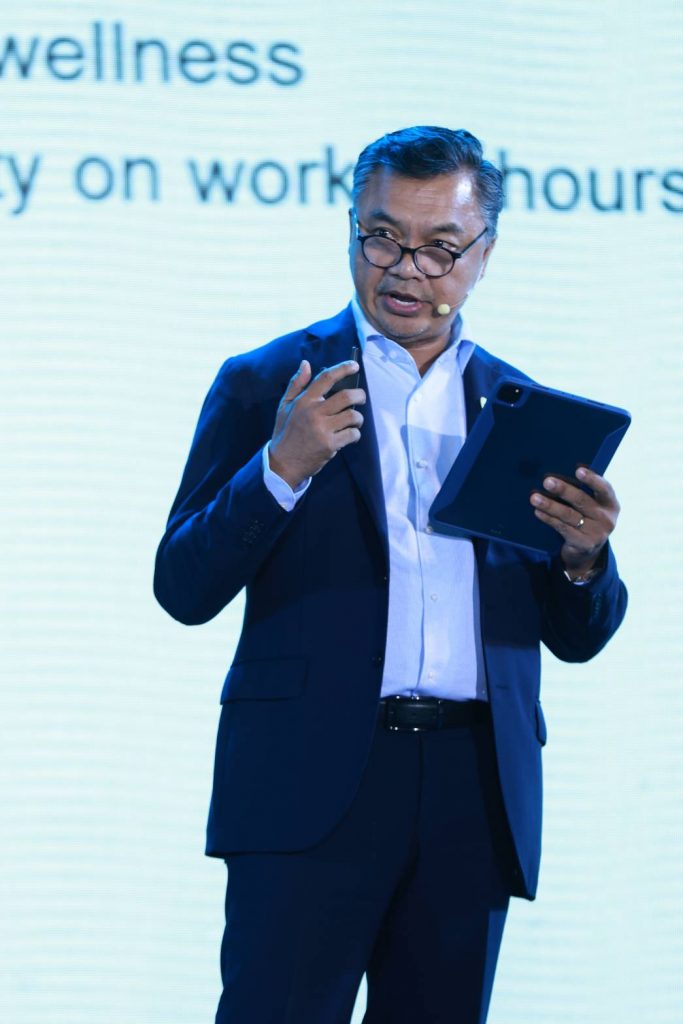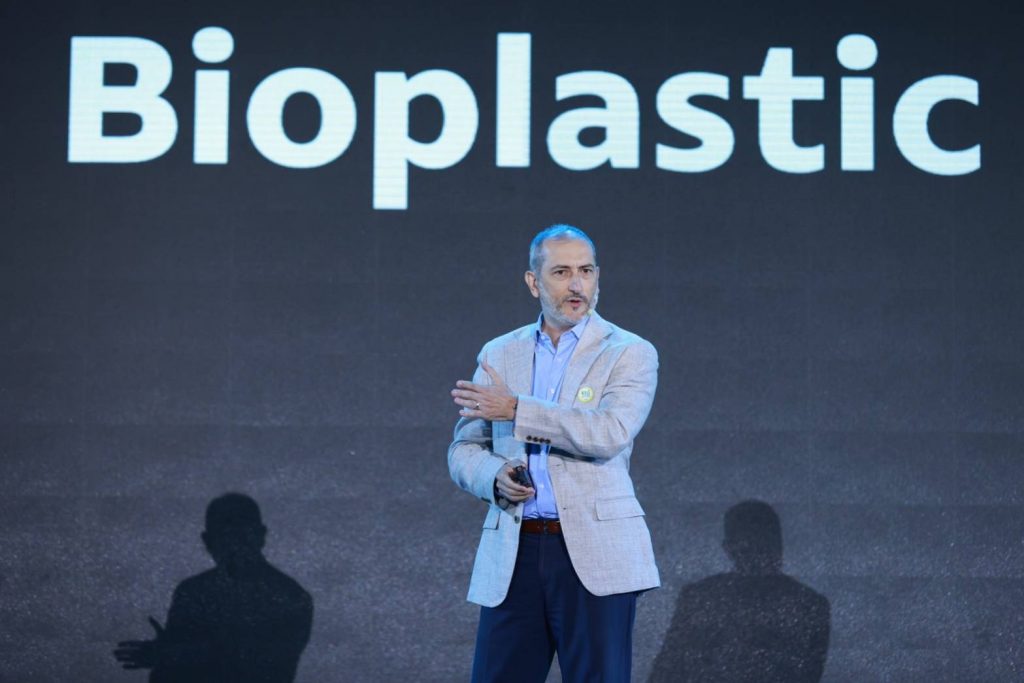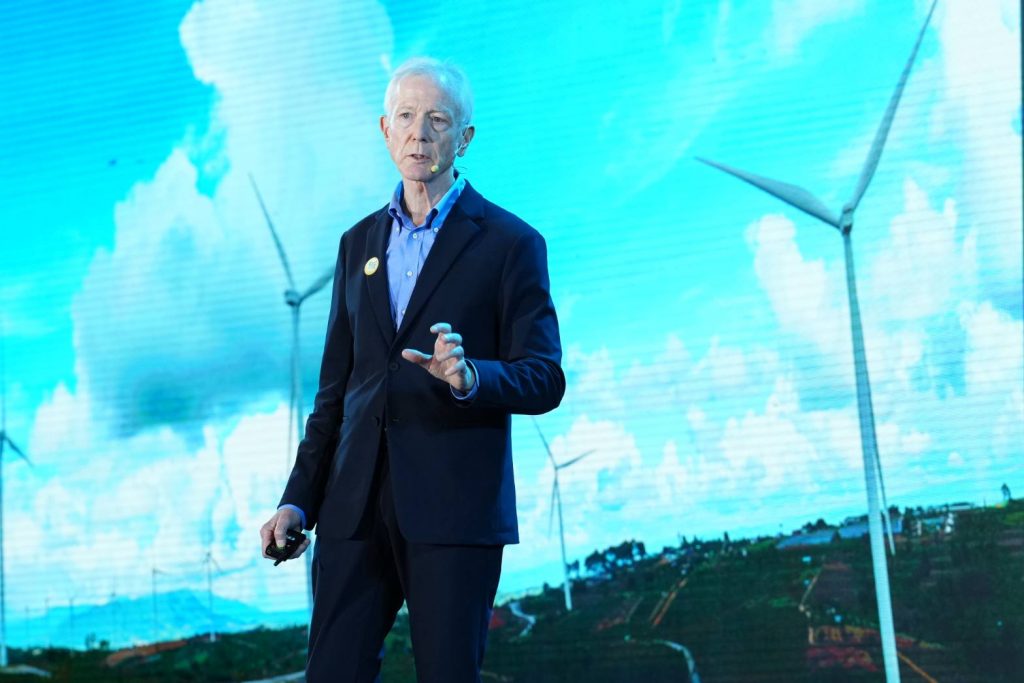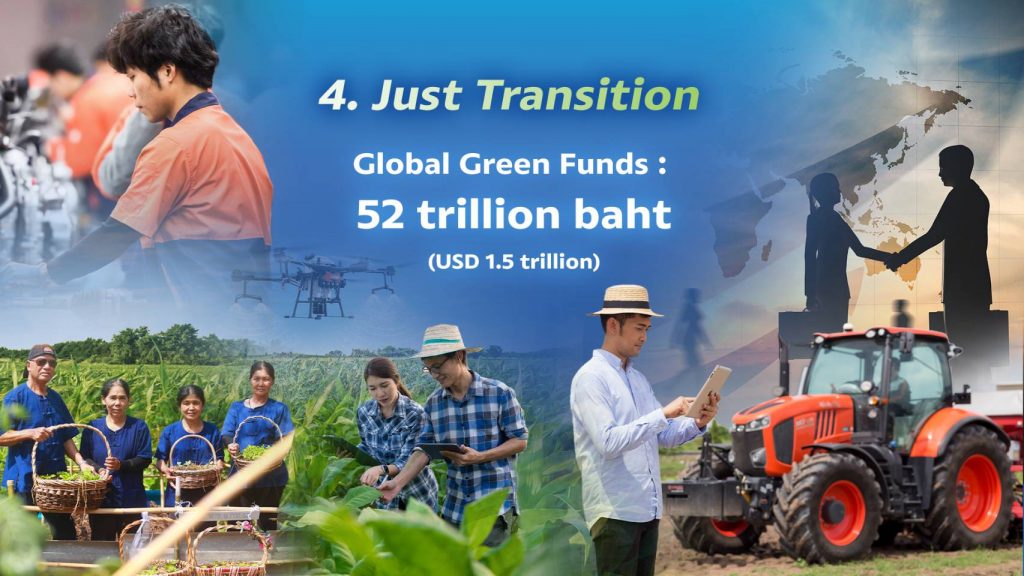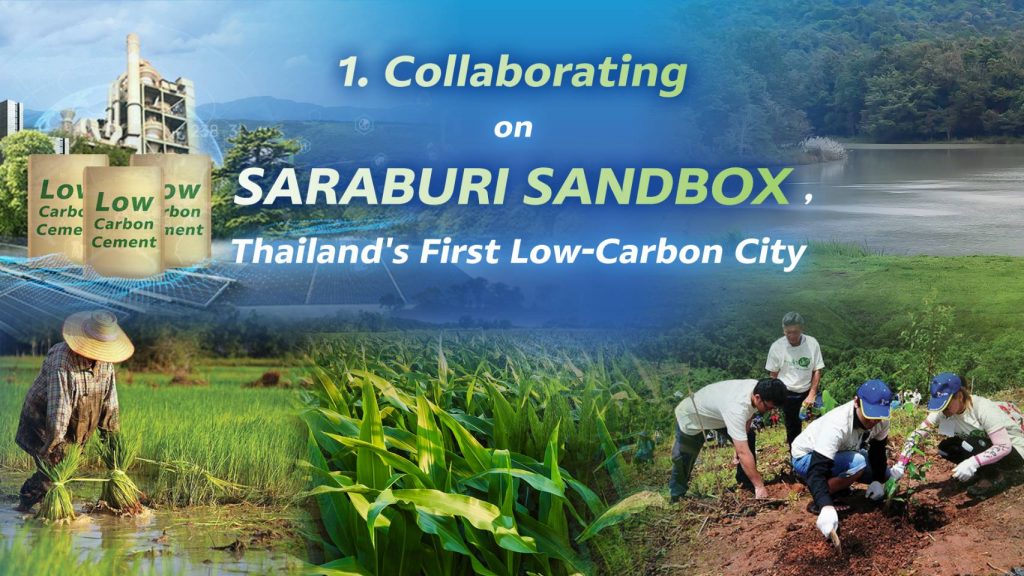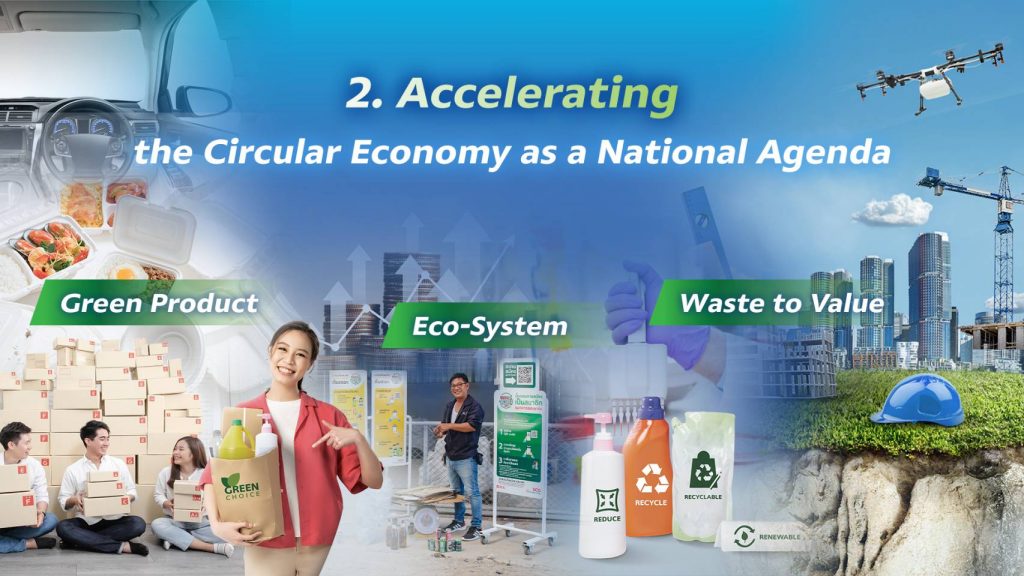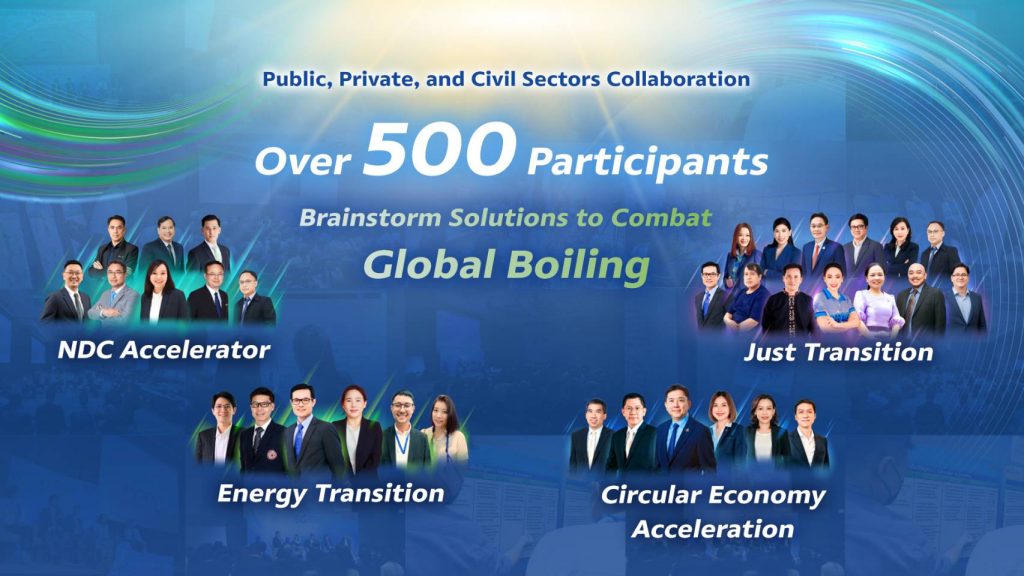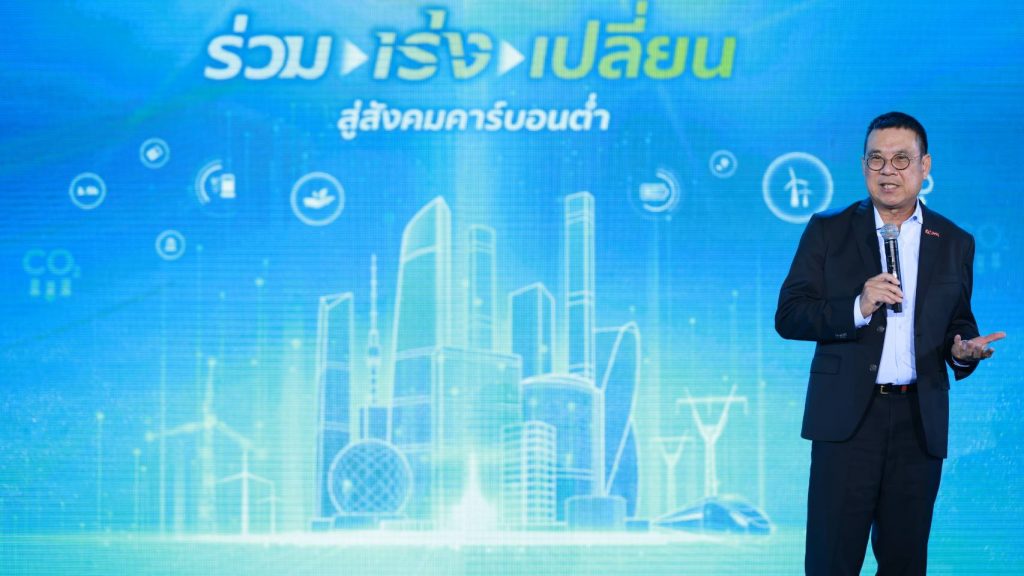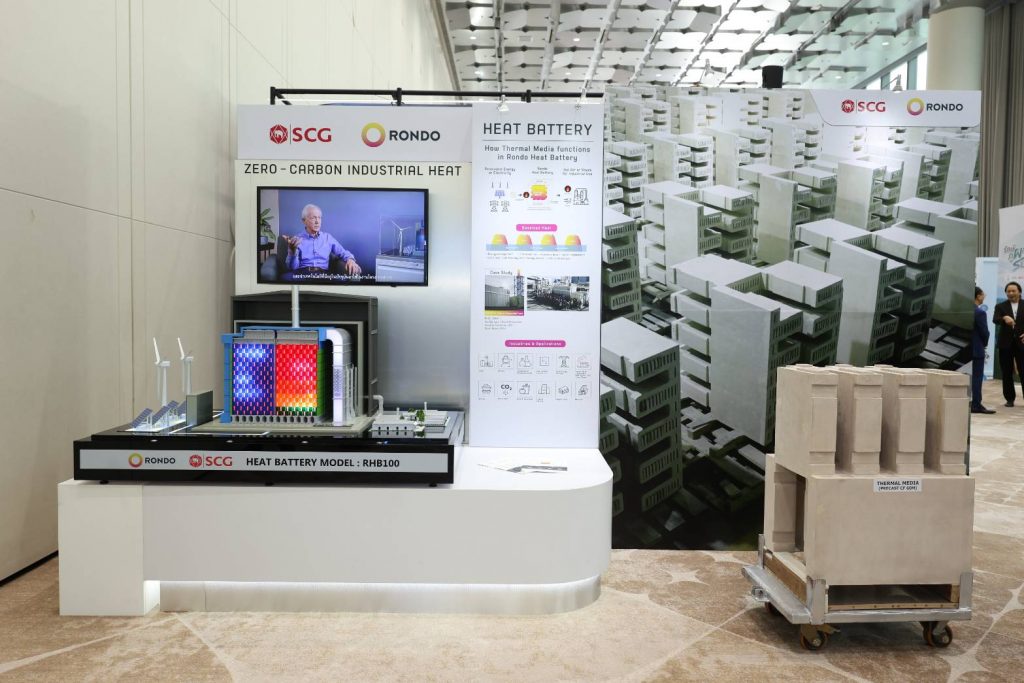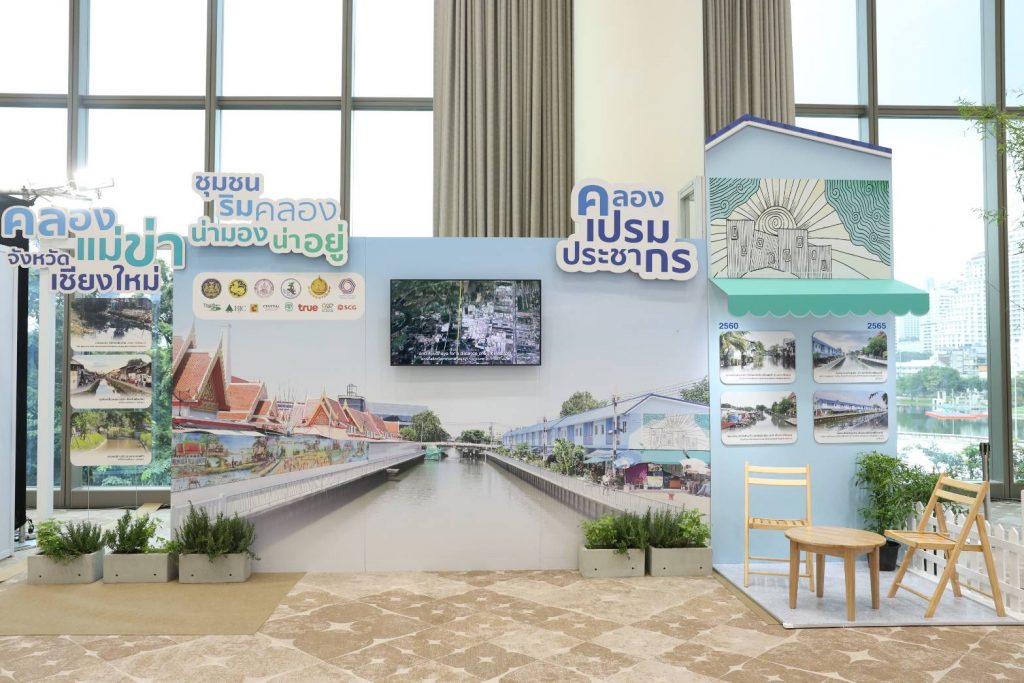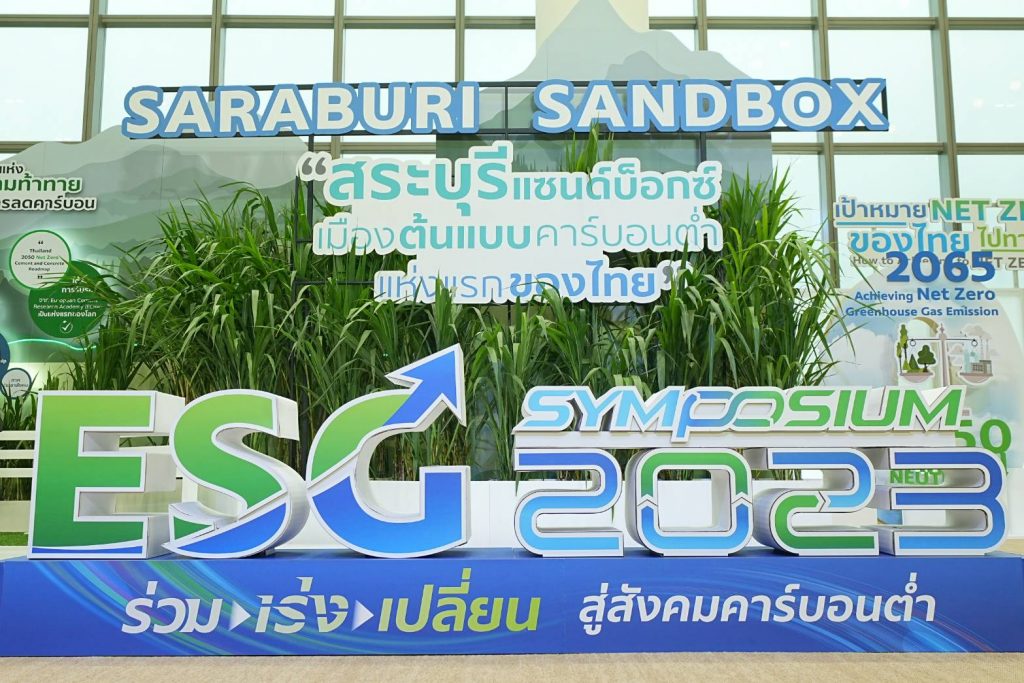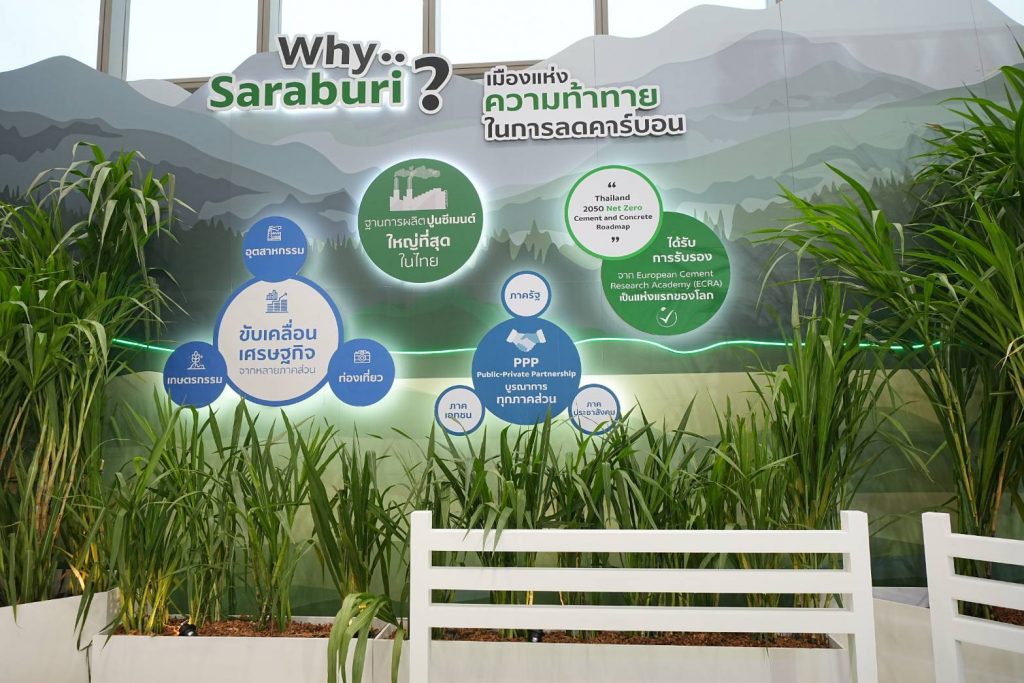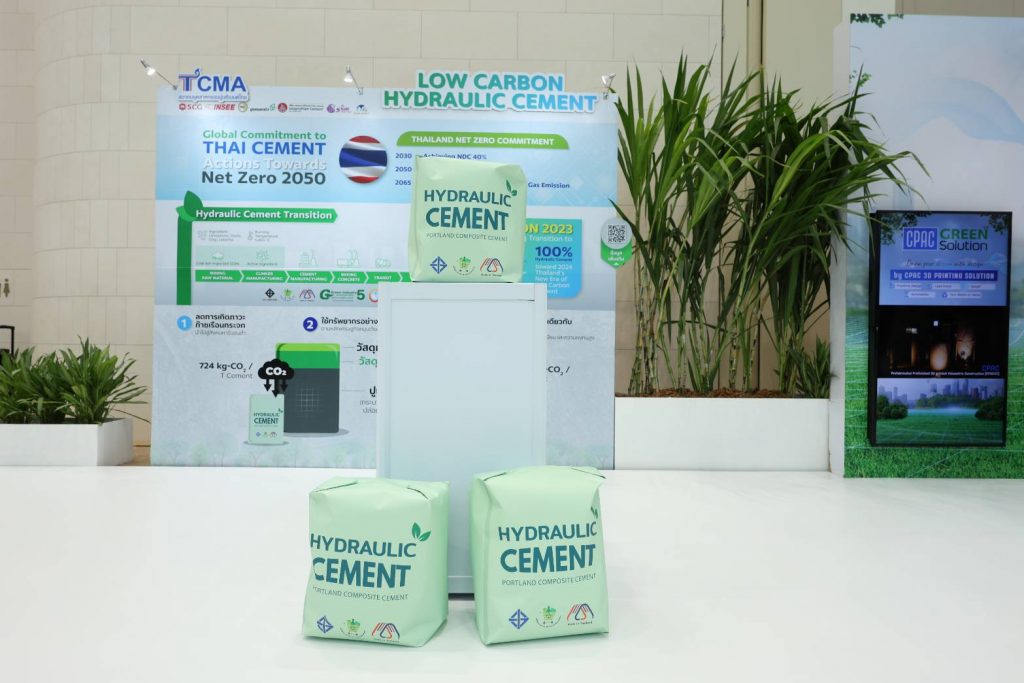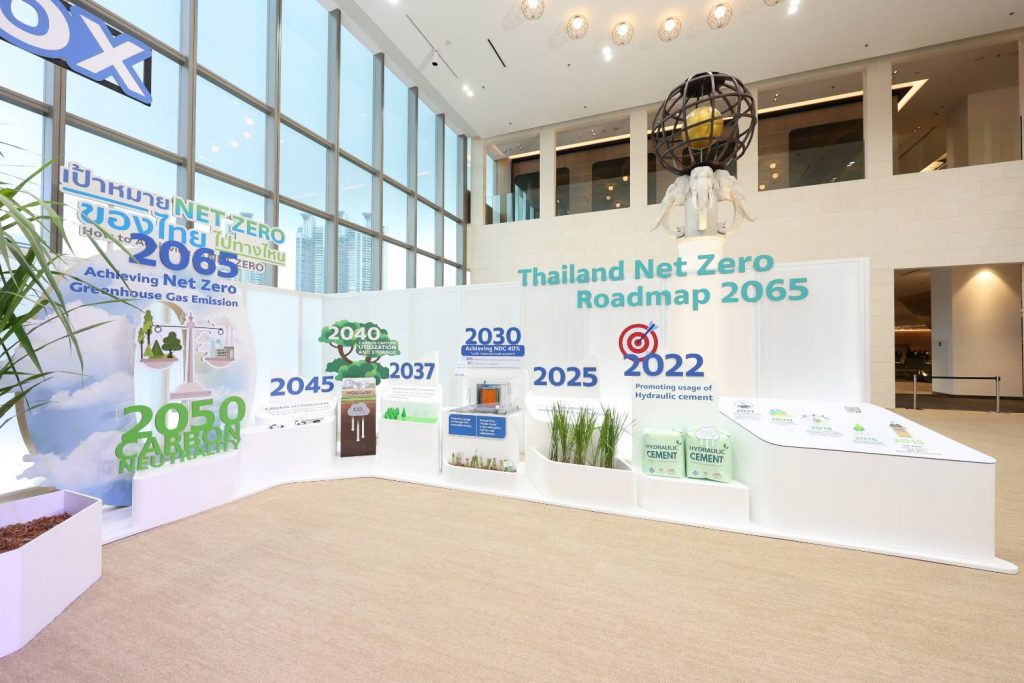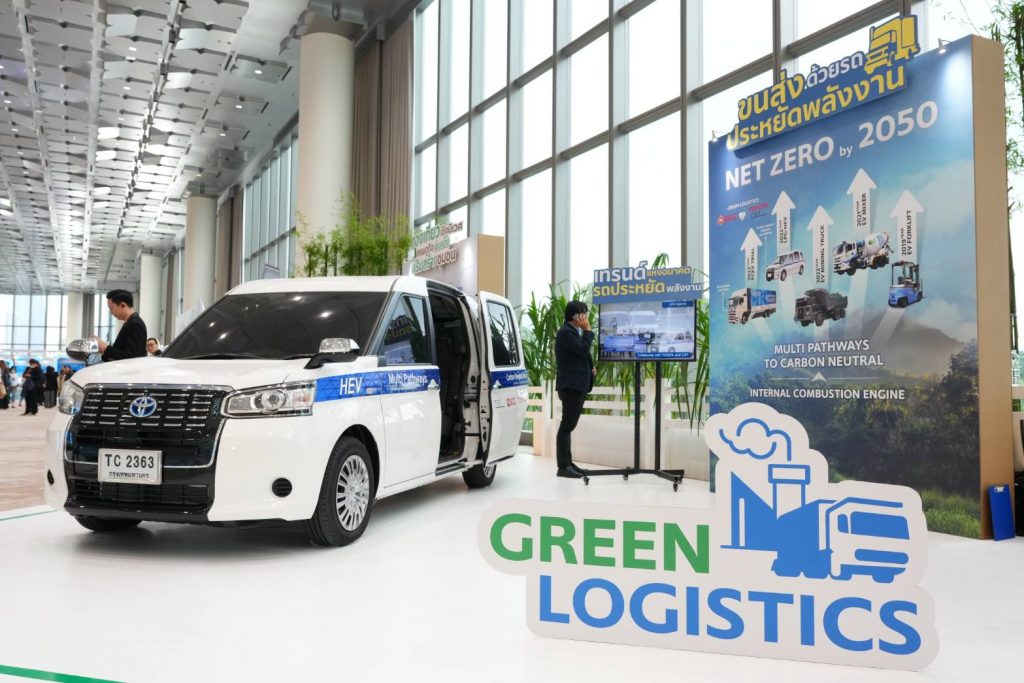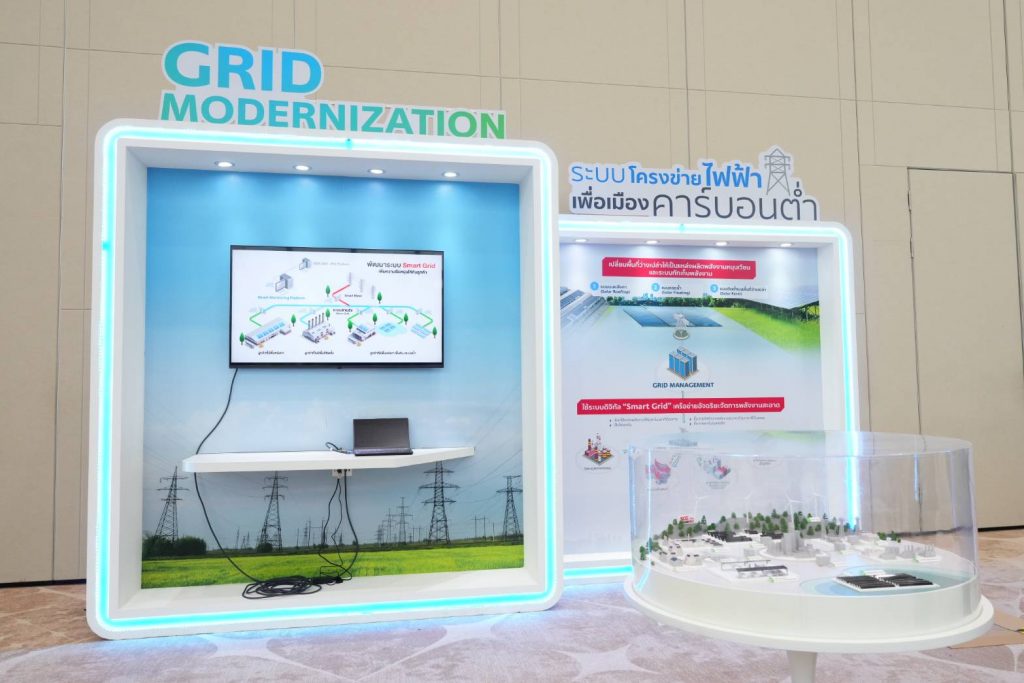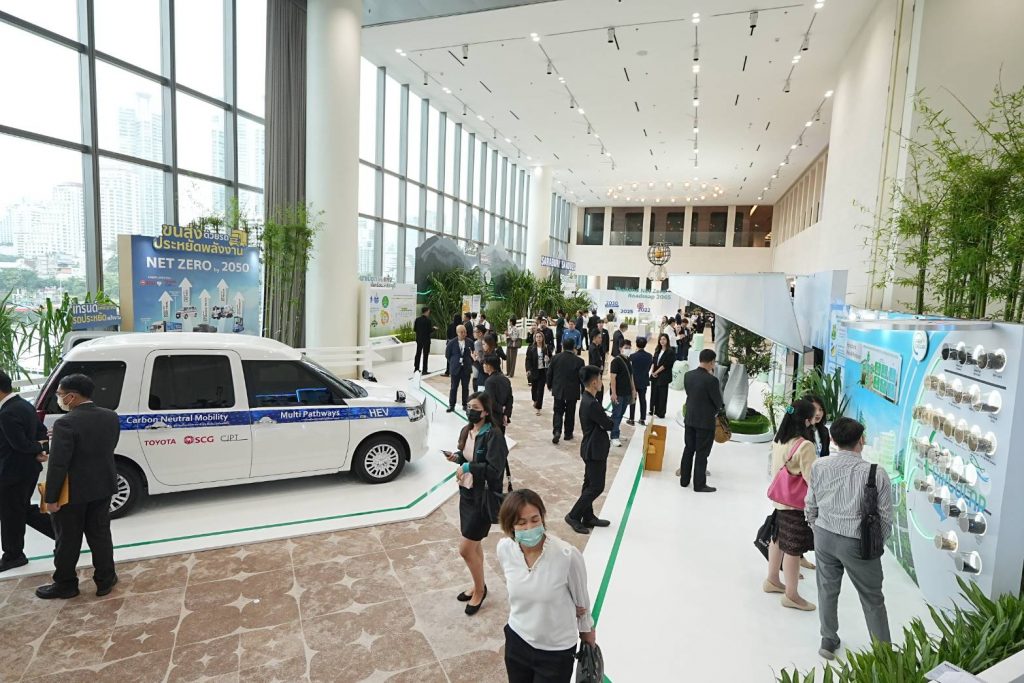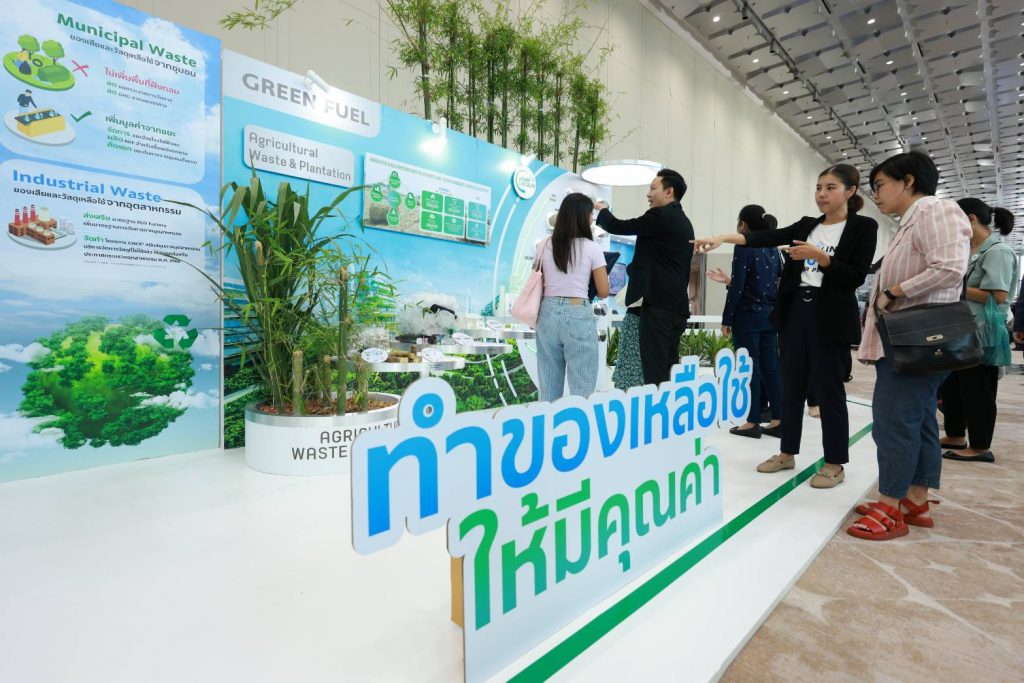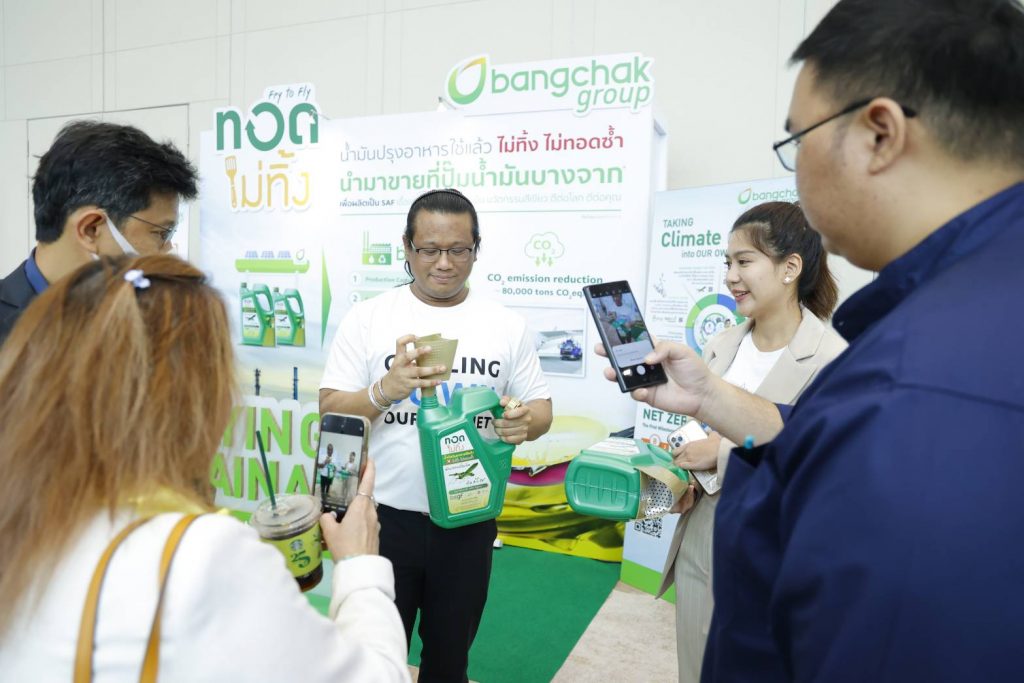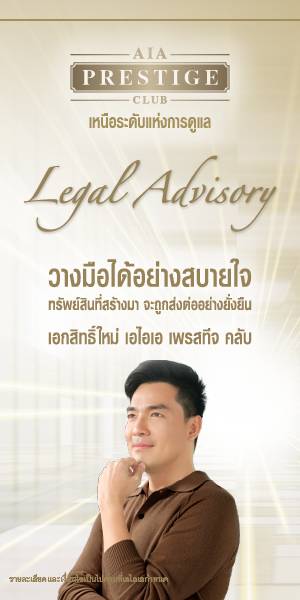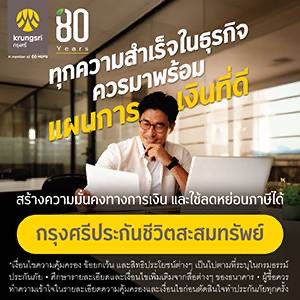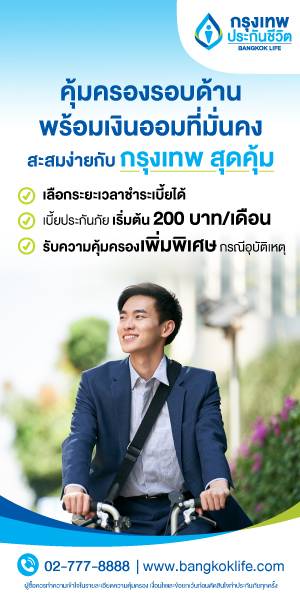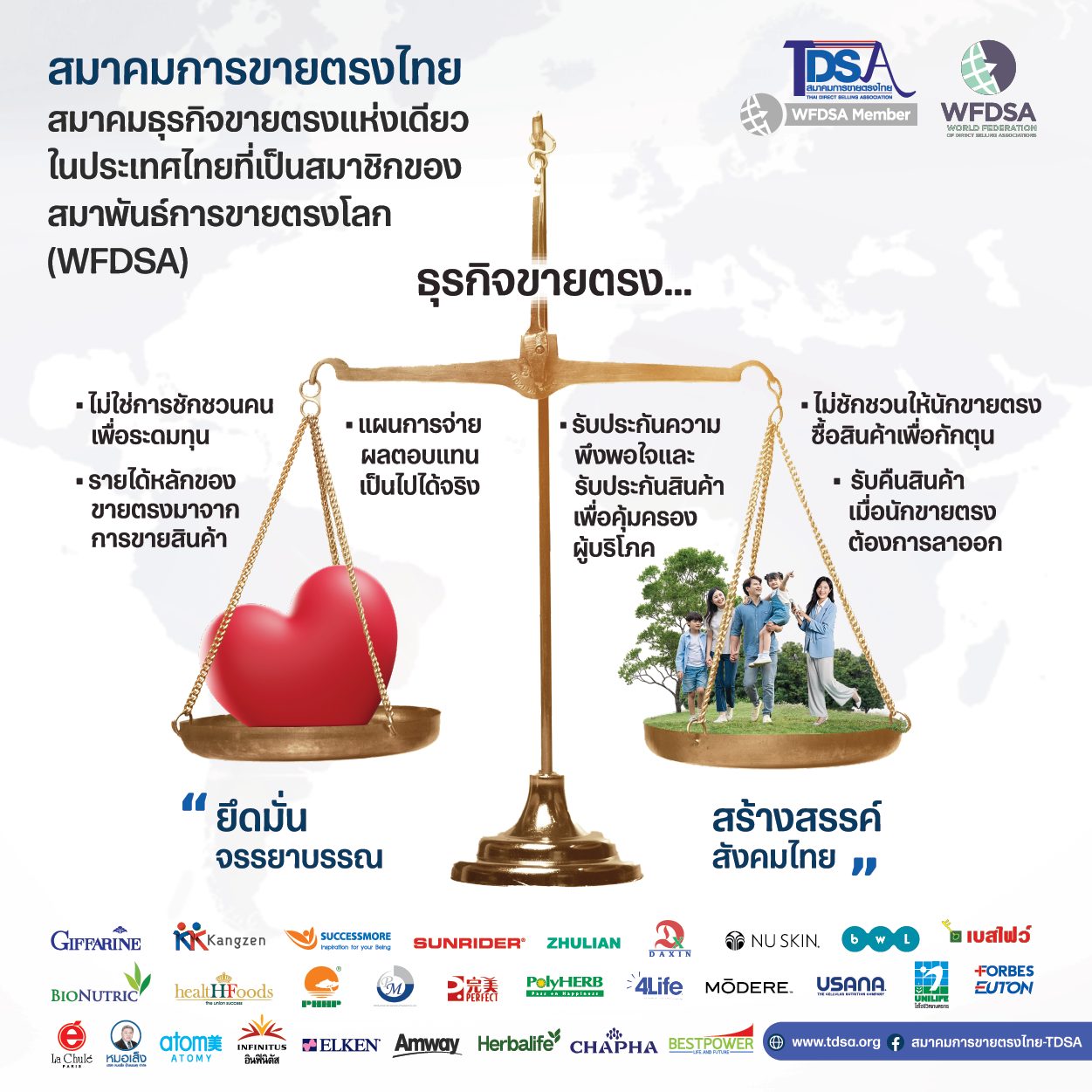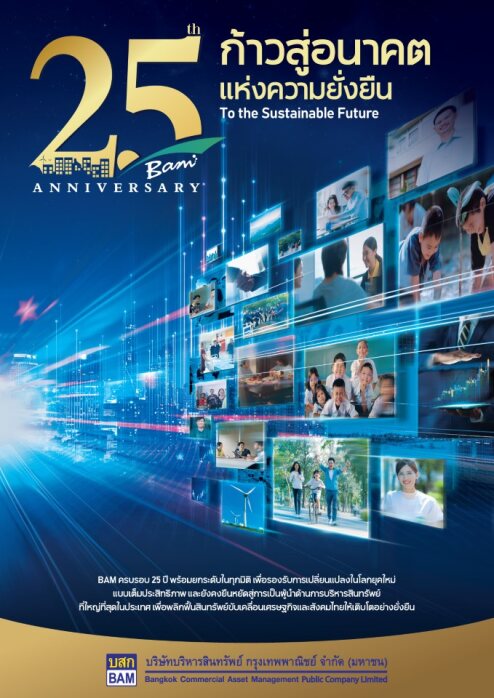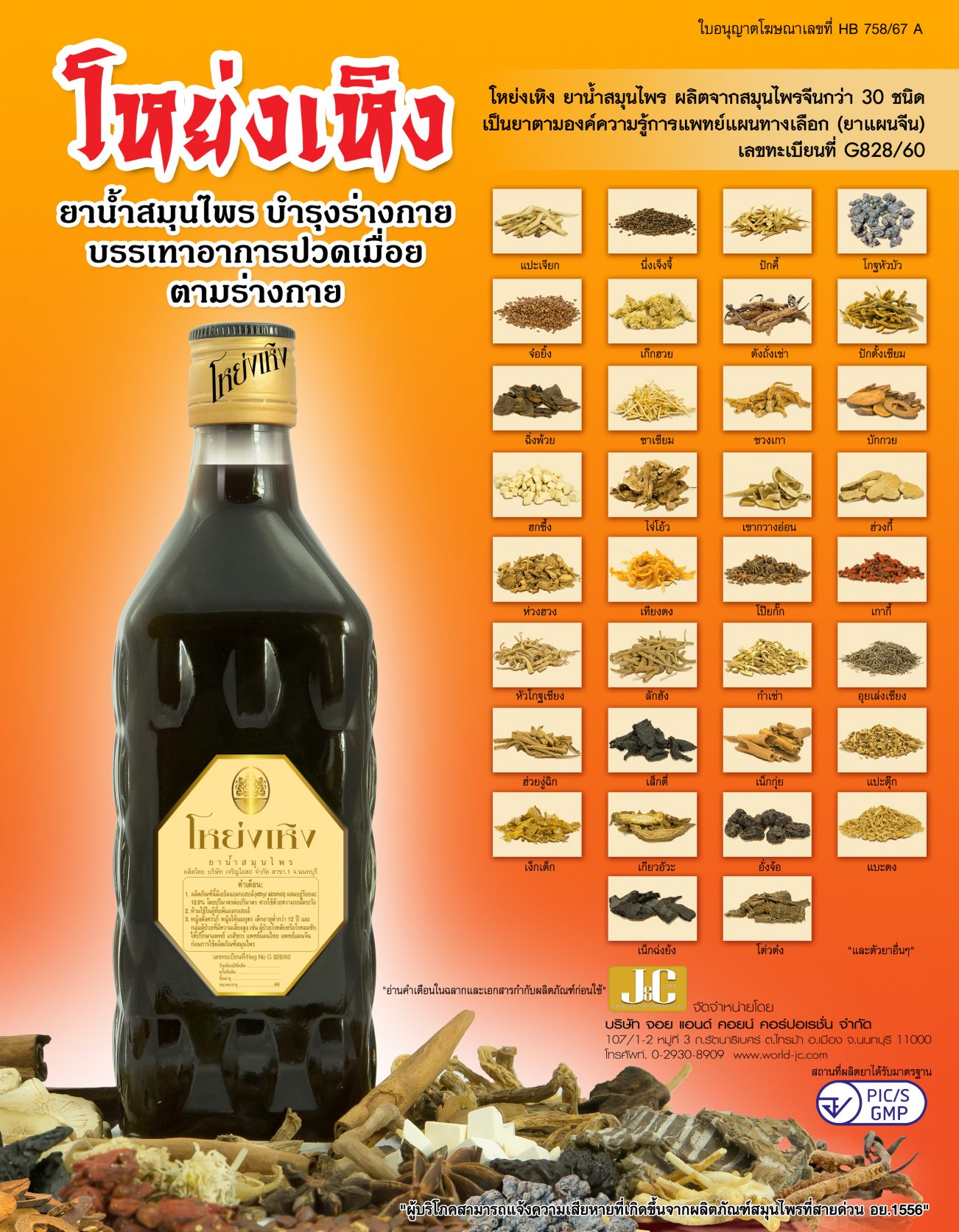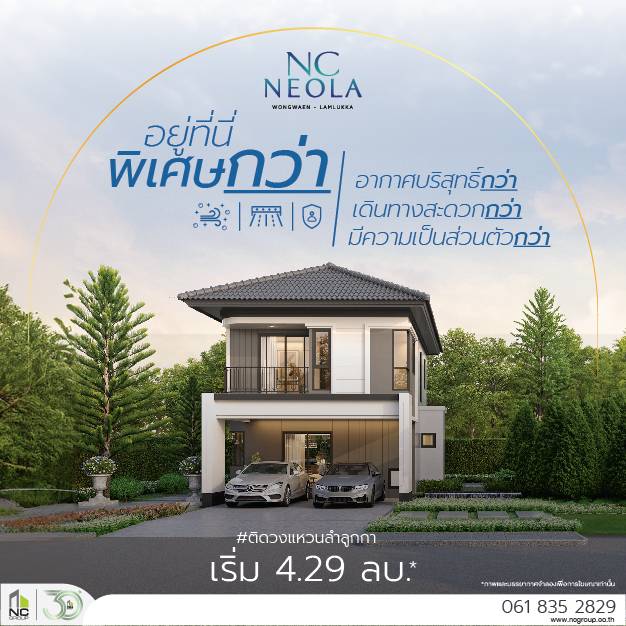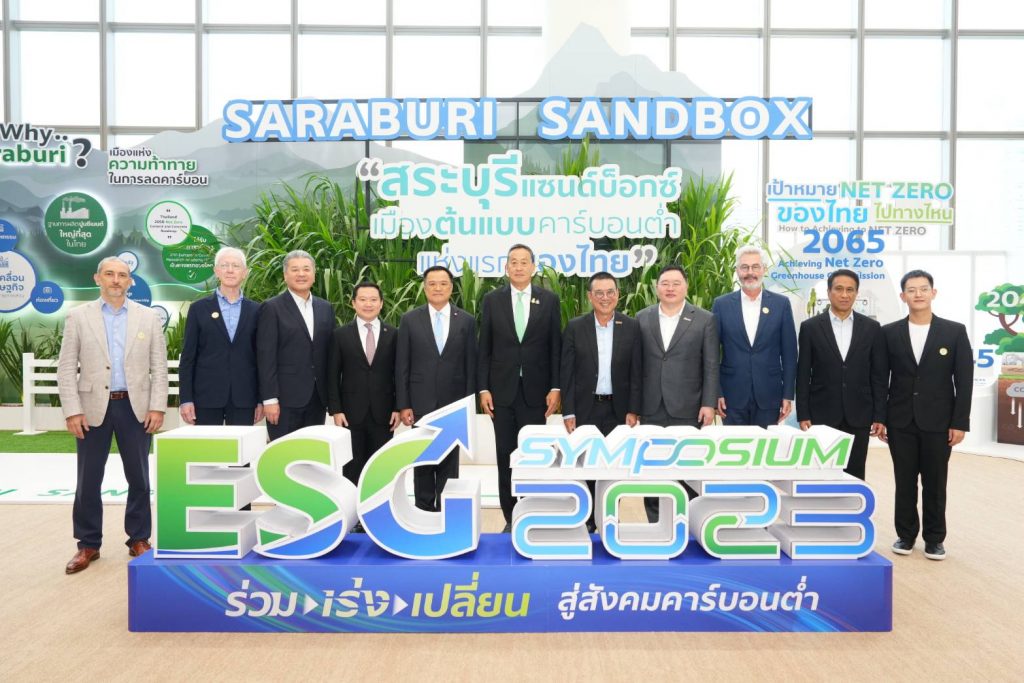
นายกฯ ชื่นชมข้อเสนอจากการระดมสมองภาครัฐ เอกชน และประชาสังคม เร่งเปลี่ยนประเทศไทย สู่สังคมคาร์บอนต่ำ ชวนทุกภาคส่วนร่วมสร้างสระบุรีแซนด์บ็อกซ์ เมืองต้นแบบคาร์บอนต่ำแห่งแรกของไทย พร้อมหนุนขยายผลเศรษฐกิจหมุนเวียน และการเปลี่ยนสู่พลังงานสะอาด โดยจะไม่ทิ้งใครไว้ข้างหลัง รองรับการขยายตัวเศรษฐกิจ ดึงดูดนักลงทุน เชื่อมั่นพลังความร่วมมือจะพาไทยเติบโตแบบคาร์บอนต่ำได้สำเร็จ
ในงาน ESG Symposium 2023
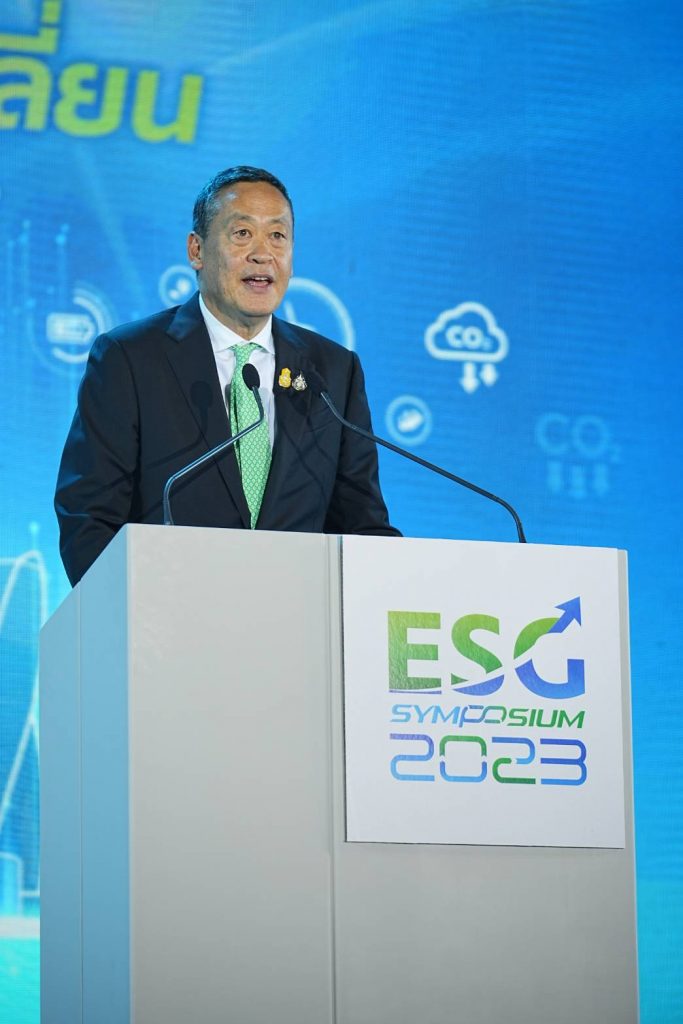
บ่ายวันนี้ (5 ต.ค. 66) นายกรัฐมนตรี นายเศรษฐา ทวีสิน ได้ร่วมงาน ESG Symposium 2023 ซึ่งจัดขึ้นเป็นปีที่ 11 ในหัวข้อ “ร่วม เร่ง เปลี่ยน สู่สังคมคาร์บอนต่ำ” ด้วยความร่วมมือจากหอการค้าร่วมต่างประเทศในประเทศไทย หอการค้าไทยและสภาหอการค้าแห่งประเทศไทย สภาอุตสาหกรรมแห่งประเทศไทย และเอสซีจี ณ ศูนย์การประชุมแห่งชาติสิริกิติ์
มีผู้ร่วมงานจากทุกภาคส่วนกว่า 2,000 คน โดยนายกรัฐมนตรีได้รับฟังข้อเสนอ “ร่วม เร่ง เปลี่ยนประเทศไทย สู่สังคมคาร์บอนต่ำ” ที่มาจากการระดมสมอง ทั้งภาครัฐ เอกชนและประชาสังคมกว่า 500 คน ตลอดเดือนกันยายนที่ผ่านมา ประกอบด้วย 4 แนวทาง ได้แก่
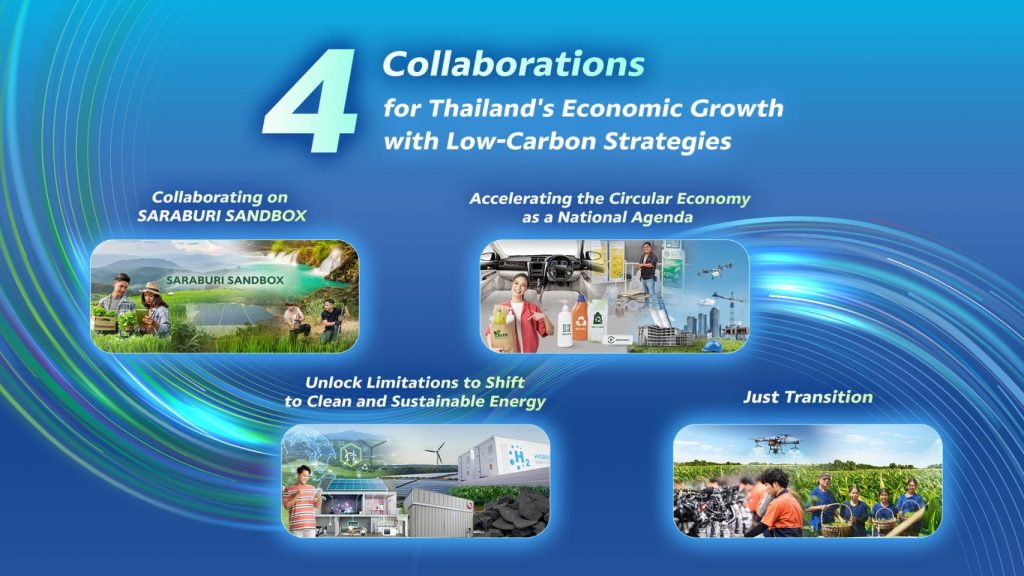
1) ร่วมสร้าง “สระบุรีแซนด์บ็อกซ์” เมืองต้นแบบคาร์บอนต่ำแห่งแรกของไทย ที่ขับเคลื่อนเศรษฐกิจด้วยอุตสาหกรรมสีเขียว เกษตรยั่งยืน ท่องเที่ยวเชิงนิเวศ เนื่องจากสระบุรีเป็นจังหวัดที่มีความซับซ้อนและท้าทายมาก เพราะมีระบบเศรษฐกิจทั้งภาคอุตสาหกรรมหนัก การเกษตร การท่องเที่ยว และความเป็นเมืองที่ผสมผสาน จึงสามารถเป็นตัวแทนเสมือนของประเทศไทยได้ เพื่อศึกษาเรียนรู้ปัจจัยความสำเร็จและข้อจำกัดต่าง ๆ ในการเปลี่ยนสู่เมืองคาร์บอนต่ำ ซึ่งร่วมบูรณาการโดยผู้ที่อยู่ในอุตสาหกรรมจริง เจ้าหน้าที่ที่เกี่ยวข้องโดยตรง และภาคประชาสังคมที่ได้รับผลกระทบ หากประสบความสำเร็จจะเป็นแรงจูงใจให้จังหวัดอื่น ๆ ได้ ปัจจุบันมีความร่วมมือเกิดขึ้นแล้ว อาทิ การกำหนดใช้ปูนซีเมนต์คาร์บอนต่ำในทุกงานก่อสร้างในจังหวัดสระบุรีตั้งแต่ปี 2567 เป็นต้นไป การทำนาเปียกสลับแห้ง ช่วยลดการใช้น้ำ การปลูกพืชพลังงาน หญ้าเนเปียร์ และนำของเหลือจากการเกษตรไปแปรรูปเป็นพลังงานทดแทน สร้างรายได้ให้ชุมชน รวมทั้งร่วมปลูกป่าชุมชน 38 แห่งทั่วจังหวัด ช่วยดูดซับก๊าซเรือนกระจก และนำไปสู่การท่องเที่ยวเชิงนิเวศ สร้างรายได้ให้ชุมชน
2) เร่งผลักดันเศรษฐกิจหมุนเวียนให้เป็นวาระแห่งชาติ เพราะเป็นการสร้างการเติบโตทางเศรษฐกิจแบบ
คาร์บอนต่ำ ในประเทศไทยมี 3 อุตสาหกรรมที่ลงมือทำแล้ว คืออุตสาหกรรมบรรจุภัณฑ์ ยานยนต์ และก่อสร้าง ปัจจัยสำคัญที่ทำให้เศรษฐกิจหมุนเวียนเกิดขึ้นได้จริง คือ กำหนดนโยบาย กฎหมาย มาตรฐาน การคัดแยกและจัดเก็บขยะเป็นระบบเดียวกันทั้งประเทศ กำหนดตัวชี้วัดในการติดตามผล ตลอดจนสร้าง Eco-system สนับสนุนสิทธิประโยชน์ในการลงทุนและพัฒนาเทคโนโลยีที่เกี่ยวข้องกับเศรษฐกิจหมุนเวียน รวมทั้งรณรงค์ใช้สินค้ากรีนที่ผลิตจากวัสดุรีไซเคิลหรือวัสดุชีวภาพ ออกกฎหมายระบุปริมาณอย่างชัดเจน โดยหน่วยงานภาครัฐนำร่องจัดซื้อจัดหาสินค้ากรีน เพื่อให้เกิดการยอมรับอย่างแพร่หลาย
3) เปลี่ยนสู่พลังงานสะอาดและยั่งยืน ปลดล็อกข้อจำกัด โดยเปิดเสรีซื้อ-ขายไฟฟ้าพลังงานสะอาดด้วยระบบโครงข่ายไฟฟ้าอัจฉริยะ (Grid Modernization) เพื่อให้ภาครัฐและเอกชนใช้เครือข่ายไฟฟ้าร่วมกัน ให้ทุกคนเข้าถึงพลังงานสะอาดสะดวกยิ่งขึ้น สนับสนุนการพัฒนาเทคโนโลยีแบตเตอรี่กักเก็บพลังงานสะอาดและใช้พื้นที่ว่างเปล่ากักเก็บพลังงานในรูปแบบต่าง ๆ เช่น พลังงานน้ำ พลังงานความร้อน พลังงานกล พลังงานเคมี รวมทั้งพัฒนาพลังงานทดแทนใหม่ ๆ และผลักดันให้อยู่ในแผนพลังงานชาติ เช่น พลังงานไฮโดรเจน พืชพลังงาน ขยะจากชุมชน ของเสียจากโรงงาน ตลอดจนปรับปรุงนโยบายและให้สิทธิประโยชน์ที่เอื้อต่อการใช้พลังงานสะอาด และส่งเสริมการใช้ข้อมูล Big Data เพื่อเพิ่มประสิทธิภาพการขนส่ง
4) ไม่ทิ้งใครไว้ข้างหลัง โดยเฉพาะกลุ่มเปราะบางที่ยังไม่สามารถปรับตัวได้ เช่น SMEs แรงงาน เกษตรกร และชุมชน โดยแบ่งกลุ่มผู้ได้รับผลกระทบและจัดสรรความช่วยเหลืออย่างเหมาะสม เพื่อให้ตระหนักรู้ เข้าถึงเทคโนโลยีลดคาร์บอนและแหล่งเงินทุนสิ่งแวดล้อมทั่วโลก ซึ่งมีอยู่มากถึง 52 ล้านล้านบาท และขอเสนอให้ไทยควรร่วมเร่งเข้าถึงกองทุนดังกล่าว เพื่อขับเคลื่อนสังคมคาร์บอนต่ำให้เกิดขึ้นจริงอย่างเป็นรูปธรรม เช่น กองทุนนวัตกรรมจัดการน้ำให้กลุ่มเกษตรกรรับมือสภาพภูมิอากาศแปรปรวน กองทุนฟื้นฟูและเพิ่มพื้นที่ป่าพร้อมสร้างรายได้จากคาร์บอนเครดิต
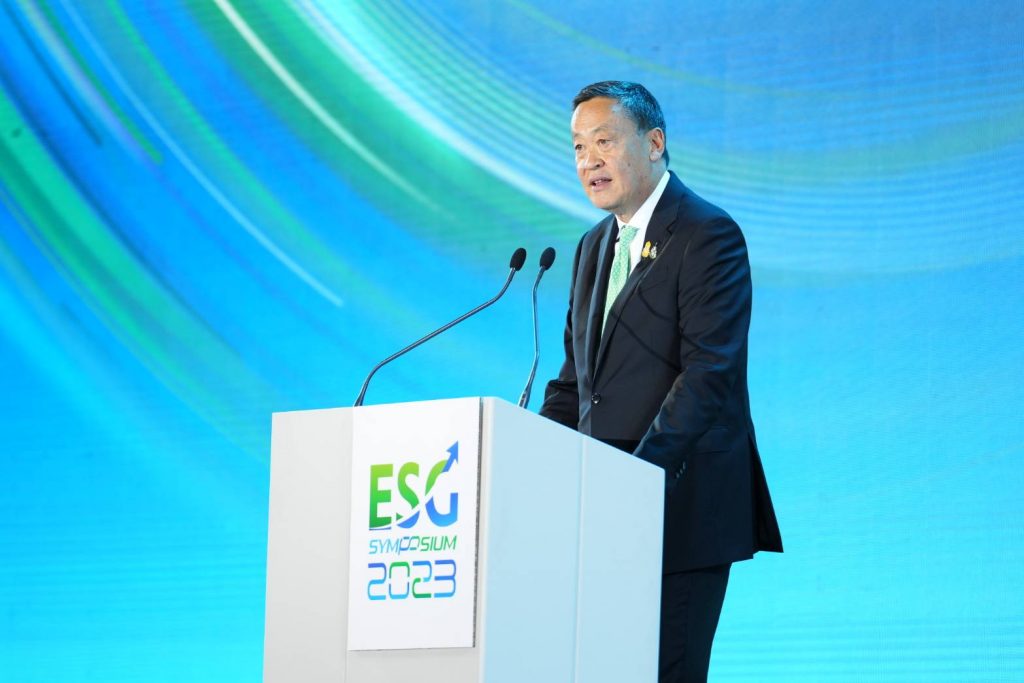
นอกจากนี้ ยังควรพัฒนาทักษะแรงงานที่ได้รับผลกระทบจากการเปลี่ยนผ่านให้มีความพร้อมปรับตัวทันท่วงทีและพึ่งพาตัวเองได้นายกรัฐมนตรี นายเศรษฐา ทวีสิน กล่าวชื่นชมข้อเสนอดังกล่าว และเชื่อมั่นว่า หากทุกภาคส่วนร่วมมือกันตามกลยุทธ์ ESG (Environmental, Social, and Governance) ที่เน้นสร้างเศรษฐกิจควบคู่กับสมดุลทางสังคมและสิ่งแวดล้อมอย่างโปร่งใส มุ่งสู่เป้าหมายการพัฒนาอย่างยั่งยืน จะช่วยกู้โลกให้กลับมาดีขึ้น สำหรับการพัฒนาเศรษฐกิจที่ยั่งยืนของไทยต้องมีแนวทางที่นำไปสู่การเปลี่ยนผ่านที่ชัดเจน โดยมีประชาชนเป็นศูนย์กลาง ดังนี้
1) มุ่งมั่นการพัฒนาที่ยั่งยืนโดยไม่ทิ้งใครไว้ข้างหลัง ผ่านหลักการไปให้ถึงและช่วยเหลือกลุ่มที่รั้งท้ายก่อน
2) ส่งเสริมสิทธิมนุษยชนและความเท่าเทียมทางเพศ สำหรับประชากรทุกคนในประเทศ และให้ความสำคัญกับสิทธิด้านสุขภาพ
3) ผลักดันความร่วมมือทุกระดับ เพื่อรับมือการเปลี่ยนแปลงสภาพภูมิอากาศ รวมถึงส่งเสริมการเข้าถึงบริการพลังงานสมัยใหม่ ในราคาที่เหมาะสมและมีความน่าเชื่อถือภายในปี ค.ศ 2030
“ผมรู้สึกประทับใจมาก ที่ได้เห็นคนไทยทุกภาคส่วน ทั้งภาคเอกชน ภาครัฐ ภาควิชาการ และภาคประชาสังคม ร่วมกันหาแนวทางทำให้ประเทศไทยเป็นสังคมคาร์บอนต่ำ เพราะภาวะโลกเดือดส่งผลกระทบต่อความเป็นอยู่ของทุกชีวิตบนโลก
ผมชื่นชมความตั้งใจสร้าง “สระบุรีแซนด์บ็อกซ์” เมืองต้นแบบคาร์บอนต่ำแห่งแรกของไทย เพราะเป็นจังหวัดที่มีความท้าทายสูง มีอุตสาหกรรมใหญ่อยู่มาก ซึ่งจะสำเร็จได้ต้องอาศัยการดำเนินงานร่วมมือกันหลายส่วน ทั้งมาตรการและเงินทุน จึงขอเชิญชวนภาคส่วนอื่น ๆ มาร่วมกัน เพราะหากสำเร็จจะเป็นตัวอย่างให้เมืองและอุตสาหกรรมอื่น ๆ ต่อไป การผลักดันเศรษฐกิจหมุนเวียนให้เป็นวาระแห่งชาติ ผมชื่นชมความมุ่งมั่นทั้ง 3 อุตสาหกรรมนำร่อง ทั้งบรรจุภัณฑ์ ยานยนต์ และก่อสร้าง
ซึ่งรัฐบาลจะขยายผลความสำเร็จนี้ โดยให้ความสำคัญกับการกำหนดนโยบายจัดการขยะและเปิดให้จัดหาสินค้ากรีนเพื่อสร้าง Eco-system ที่เอื้อต่อระบบเศรษฐกิจหมุนเวียน สำหรับการส่งเสริมการใช้พลังงานสะอาด รัฐบาลจะให้ความสำคัญกับการใช้พลังงานสะอาดให้เต็มประสิทธิภาพ และศึกษาการเปิดให้สามารถซื้อ-ขายไฟฟ้าจากพลังงานสะอาดได้มากขึ้น เพื่อสร้างความมั่นคงทางพลังงาน พร้อมทั้งรองรับการขยายตัวเศรษฐกิจไทย ดึงดูดนักลงทุนและบริษัทต่างชาติในอนาคต”
นายกรัฐมนตรี กล่าวทิ้งท้ายว่า “ผมขอขอบคุณทุกคนที่มุ่งเปลี่ยนสู่สังคมคาร์บอนต่ำ โดยไม่ทิ้งใครไว้ข้างหลัง เพราะยังมีประชาชนอีกมากโดยเฉพาะธุรกิจขนาดเล็ก เกษตรกร และชุมชน ที่ยังไม่ตระหนักถึงวิกฤตินี้ หรือยังไม่พบทางออกเพื่อรับมือ เราควรสนับสนุนการเข้าถึงความรู้ เทคโนโลยี และการเข้าถึงเงินทุน ให้ทุกคนสามารถปรับตัวอยู่รอดได้ สำหรับข้อเสนอในวันนี้ ผมจะมอบหมายให้หน่วยงานที่เกี่ยวข้องดำเนินการต่อไป
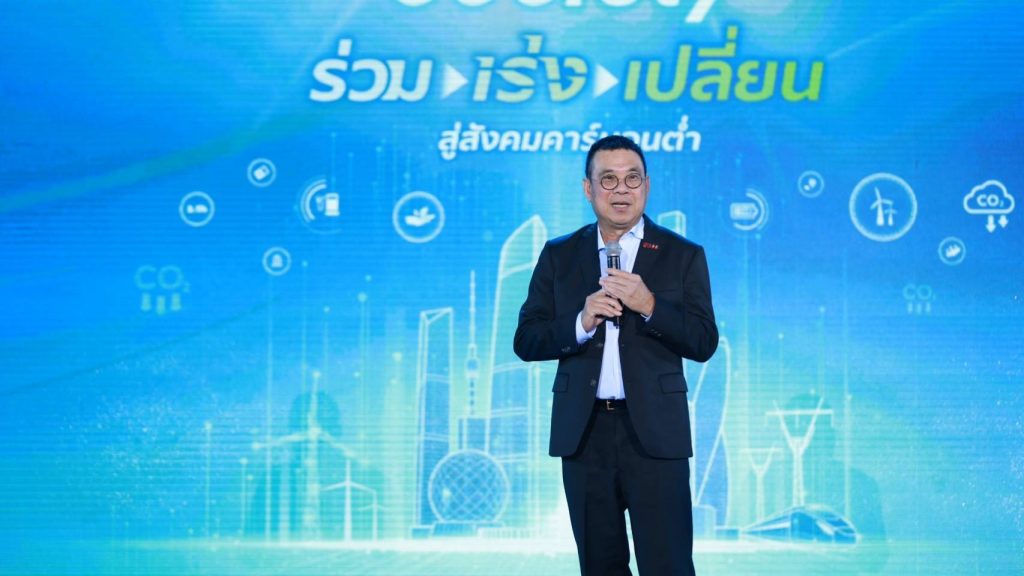
นายรุ่งโรจน์ รังสิโยภาส กรรมการผู้จัดการใหญ่ เอสซีจี กล่าวว่า “คณะจัดงานขอบคุณท่านนายกรัฐมนตรีที่ให้เกียรติมาร่วมงาน และรับฟังข้อเสนอจากพวกเราทุกภาคส่วนในวันนี้ ผมเชื่อมั่นว่าภายใต้การบริหารงานของท่านที่มีความมุ่งมั่นในการพัฒนาที่ยั่งยืน โดยไม่ทิ้งใครไว้ข้างหลัง พร้อมทั้งแนวนโยบายที่ชัดเจนของประเทศ จะทำให้ทุกภาคส่วนทำงานร่วมกันอย่างแข็งแกร่ง เพื่อขับเคลื่อนประเทศให้ก้าวหน้าอย่างมั่นคงและยั่งยืน”
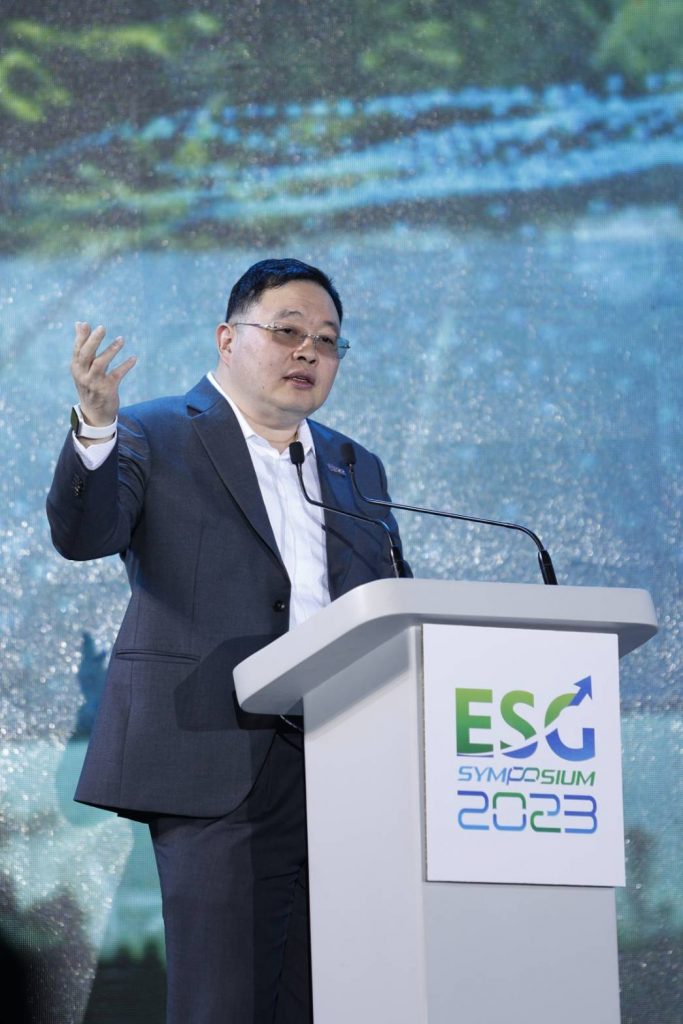
นายธรรมศักดิ์ เศรษฐอุดม รองกรรมการผู้จัดการใหญ่ เอสซีจี กล่าวว่า “เอสซีจีพร้อมนำแนวทางจากท่านนายกรัฐมนตรีไปผลักดันอย่างต่อเนื่อง ทั้งเร่งพัฒนากระบวนการผลิตสีเขียว ควบคู่กับนวัตกรรมกรีน เช่น ปูนคาร์บอนต่ำ พลาสติกรักษ์โลก บรรจุภัณฑ์ย่อยสลายได้ อีกทั้งผสานความร่วมมือกับทุกภาคส่วนแก้วิกฤติโลกเดือด ซึ่งเย็นวันนี้ 80 ซีอีโอ จากหลายอุตสาหกรรม เช่น ภาคพลังงาน การผลิต อสังหาริมทรัพย์ ยานยนต์ สุขภาพ บริการ มาร่วมระดมสมองเพิ่มเติม ซึ่งมั่นใจว่าจะสนับสนุนให้เศรษฐกิจไทยเติบโต พร้อมโลว์คาร์บอน เป็นจริงได้แน่นอน”
Thai PM Praises Proposal to Transition Thailand into a Low-Carbon Society;
Confident in Cross-sector Collaboration to Foster Low-Carbon Growth in Thailand
The Prime Minister lauded the proposal resulting from collaborative brainstorming sessions among the public, private, and civil society sectors to accelerate Thailand’s transition to a low-carbon society. He invited all stakeholders to join in establishing the Saraburi Sandbox, poised to be Thailand’s first low-carbon model city. He further underscored the importance of expanding the circular economy, transitioning to clean energy, and ensuring that no one is left behind, all of which are crucial to fostering economic growth and attracting investors. He expressed his belief in the power of collaboration to steer Thailand towards a low-carbon future at the ESG Symposium 2023.
This afternoon (5 October 2023), Prime Minister Srettha Thavisin attended the ESG Symposium 2023. Now in its 11th year, the event was themed “Accelerating Changes Towards Low Carbon Society.” The symposium was organized in collaboration with foreign chambers of commerce in Thailand, the Chamber of Commerce and the Board of Trade of Thailand, the Federation of Thai Industries, and SCG. Hosted at the Queen Sirikit National Convention Center, the event saw the participation of over 2,000 representatives from various sectors. The Prime Minister listened to the proposal titled “Accelerating Thailand Towards a Low Carbon Society,” an outcome of brainstorming sessions in September involving more than 500 participants from the public, private, and civil society sectors. The proposal outlines four main pathways, namely:
1) Collaborating to establish the “Saraburi Sandbox,”: Thailand’s first low-carbon model city, propelled by green industries, sustainable agriculture, and eco-tourism. Saraburi Province grapples with complexities and challenges due to its role as an economic hub, encompassing heavy industries, agriculture, tourism, and a metropolitan mix. These attributes accurately represent Thailand, providing a vital case study to comprehend the success factors and challenges of transitioning to a low-carbon society. This integration process involves industry experts, relevant officials, and the affected civil society. If successful, this initiative will inspire other provinces to follow suit. Collaborative efforts are already underway; for example, there is a mandate set for using low-carbon cement in all Saraburi Province construction projects starting from 2024. Other initiatives include practicing alternate wetting and drying in paddy fields to minimize water usage, planting energy crops like Napier grass, converting agricultural waste into alternative energy sources, generating community income, and jointly planting in 38 community forests across the province to absorb greenhouse gases, which also paves the way for eco-tourism, creating additional revenue streams for the communities.
2) Make the circular economy a national agenda: Recognizing it as a pathway to achieving low-carbon economic growth. In Thailand, three sectors—the packaging, automotive, and construction industries—have already embarked on this journey. Key elements crucial for making a circular economy a reality include the establishment of clear policies, laws, and standards; unified waste separation and collection systems nationwide; well-defined metrics for tracking progress; and the nurturing of an ecosystem that amplifies investment benefits and the technology advancements relevant to the circular economy. Additional efforts encompass promoting green products made from recycled or bio-compostable materials, setting clear legal mandates on quantities, and green procurement led by government agencies to foster widespread acceptance.
3) Transitioning to Renewable and Sustainable Energy: Unlocking limitation by liberalizing renewable electricity trade through smart grid modernization. This will enable the public and private sectors to share the electricity grid for easier access and convenience. Additional efforts include support for the development of battery storage technology for renewable energy; the optimal use of vacant spaces to store energy in diverse forms, such as hydro energy, thermal energy, mechanical energy, and chemical energy; development of newer alternative energy sources and including them in the national energy plan, such as hydrogen energy, bioenergy, community waste, and industrial waste. This is complemented by revising policies, introducing incentives to foster renewable energy consumption, and leveraging Big Data to increase transportation efficiency.
4) No one is left behind: Prioritizing inclusivity is essential, particularly vulnerable groups who have not been able to adapt, such as SMEs, laborers, farmers, and local communities. By identifying affected groups and providing appropriate support, they can become aware, access to carbon-reducing technologies and global green funds, which amount to as much as 52 trillion baht. Thailand should proactively pursue these funds to truly foster a low-carbon society. Potential projects include an innovation fund for farmers to cope with fluctuating weather conditions and a fund for forest restoration while generating income from carbon credits. Additionally, it’s crucial to develop the skills of workers affected by the transition, ensuring they can adapt swiftly and become self-reliant.
Prime Minister Srettha Thavisin praised the proposal and expressed confidence that if all sectors collaborate following the ESG (Environmental, Social, and Governance) strategy—which emphasizes fostering an economy alongside social and transparent environmental balance—it will help recover our planet. To further sustainable development in Thailand, a clear transition with people at its core is essential. The outlined directions are: 1) Prioritizing sustainable development without leaving anyone behind, focusing primarily on the most vulnerable groups; 2) Promoting human rights and gender equality for everyone in the country, with an emphasis on health rights; 3) Encouraging multi-level collaboration to cope with climate change and ensuring access to modern, affordable, and reliable energy services by 2030.
“I am deeply impressed to see every sector of Thai society—including businesses, the government, academia, and the public—uniting to strategize Thailand’s transition towards a low-carbon society. The global boiling crisis impacts the existence of every life form on Earth.
I applaud the initiative to establish the “Saraburi Sandbox” as Thailand’s first low-carbon model city. Given that Saraburi is a province with significant challenges and home to several major industries, success will require cross-sector collaboration involving strategic measures and capital. I would like to invite other stakeholders to join this effort. If successful, it could serve as an exemplary model for other cities and industries.
For accelerating the circular economy as a national agenda, I commend the commitment of the three pioneering industries: packaging, automotive, and construction. The government intends to build on this success by prioritizing waste management policies and endorsing green procurement. Such efforts will nurture an ecosystem conducive to the circular economy. As for the promotion of renewable energy, the government is committed to maximizing the utilization of renewable energy sources and exploring opportunities to enhance the trading of electricity generated from renewable energy sources. The goal is to ensure energy stability and foster the growth of the Thai economy. This strategic direction will attract future foreign investors and corporations.”
The Prime Minister concluded, “I would like to express my gratitude to everyone working towards transitioning to a low-carbon society without leaving anyone behind. Many people, notably small businesses, farmers, and communities, remain unaware of this crisis or have yet to find solutions. We should facilitate access to knowledge, technology, and capital so that everyone can adapt and survive. As for today’s proposal, I will assign the relevant agencies to take further action.”
Roongrote Rangsiyopash, President & CEO of SCG, said, “We thank the Prime Minister for gracing our event and hearing our proposal today. I am confident that under your administration, which is committed to sustainable development without leaving anyone behind, coupled with the country’s clear policies, every sector will work together robustly to drive the country forward in a stable and sustainable manner.”
Thammasak Sethaudom, Executive Vice President of SCG, remarked, “SCG is ready to continuously push forward the directions set by the Prime Minister. We are speeding up the development of green production processes alongside green innovations, such as low-carbon cement, green polymer, and bio-compostable packaging. Furthermore, we are collaborating with all sectors to tackle global boiling. This evening, 80 CEOs from various industries, including energy, manufacturing, real estate, automotive, healthcare, and services, will brainstorm further. We are confident that we can support the growth of the Thai economy to be truly low-carbon.”



